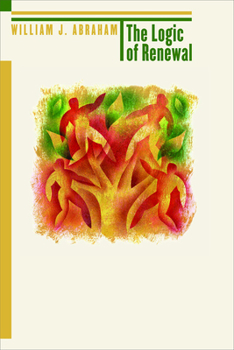The Logic of Renewal
Select Format
Select Condition 
Book Overview
The Western church is currently awash in a sea of renewal movements -- so much so that she is in danger of drowning. Across the church's many denominations and great theological divisions there is a persistent quest for change, reflected in repeated calls for "revival," "reform," revitalization," and "restoration." We now have so much literature on the topic that one is hard-pressed to keep up with it, let alone evaluate it critically. In The Logic of Renewal William Abraham helps church leaders and members get their bearings in the renewal debate by analyzing the most salient proposals for church renewal that have surfaced over the last fifty years. In successive chapters he pairs outspoken figures who (in all but one chapter) represent strongly contrasting convictions -- James T. Draper and Dennis Bennett, Lesslie Newbigin and John Shelby Spong, Rosemary Radford Ruether and Cardinal Ratzinger, Martin Luther King Jr. and Archbishop Romero, Alexander Schmemann and Gilbert Bilezikian, Don Cupitt and Edward Norman, C. Peter Wagner and R. R. Reno. Abraham gives special attention to the theological assumptions of each proposal, highlights its overall strengths and weaknesses, and develops his own proposals for church renewal through interaction with those under review. Articulate, bracing, and constructive, The Logic of Renewal will redefine the way Christians think about church life.
Format:Paperback
Language:English
ISBN:0802826563
ISBN13:9780802826565
Release Date:December 2003
Publisher:William B. Eerdmans Publishing Company
Length:172 Pages
Weight:0.64 lbs.
Dimensions:0.5" x 6.0" x 9.0"
Customer Reviews
1 rating
Abraham Brings the Voices in for Renewal
Published by Thriftbooks.com User , 15 years ago
Abraham is not writing to the academic or the theologian who decides to stay in the depths of God, but to the Church where it is. His language is often forceful, especially when he wishes to disagree with one of his examinations (149; and his issues with changing `patriarchal language' for the sake of change). He is not biting, but provides his readers with enough to chew on. His presentation, at least in as far as it seems to one who has not read many of the works examined, seems fair, although he shows the true intellectual dogma of not believing, agreeing, or accepting out of hand everything present to him, and to him us. The author is careful to let the examinees speak for themselves, and had generally aligned the comparisons neatly so as to present two different views of renewal to contract one another immediately and directly (The easiest example of this is Cupitt and Norman as well as Wagner and Reno). Most importantly was Abraham's refusal to accept fully anything presented and to consistently, even if his personal agreements seemed to come through (such as with MLK, Newbigin and Wagner). Further, his discussion of the Enlightenment throughout the book is relevant because it is something that we still face today, either in faith or in reason. For myself, I prefer the side of reason; however, through the readings on Cupitt and Spong, there are errors in reason over the Spirit which I see need to be addressed not only in myself, but so too the larger Church. This is Abraham's most important contribution, in that Abraham readily secures against the full encroachment of the Enlightenment's brand of Reason, but challenges those, such as Draper, Norman and Wagner, to make use of intellectual integrity to propel the Church forward. Finally, Abraham, against Cupitt and others who wish to simply dismiss the `canonical' tools of the Church, instead insists on holding more firmly to them to guide us into renewal. While Abraham sees the renewal of the church heavily dependent upon the canons of the past (169), I would have preferred to see a chapter by him (although admittedly, his work on this subject most likely addresses it fully) directly on this subject. The Scriptural canon is something still held differently by Catholics, Orthodox and Protestants, and among Protestants there are the debates involving translations, such as the King James Version only movement and the use of inclusive language. Further, there is the notion of original text, which as F.F. Bruce would point out, is a canonical question all of its own. Then, there are the Councils, of which Protestants hold to just a few, as well as the Creeds which many Protestants simply dismiss as unnecessary, or hold in vile and utter contempt. While I appreciate his allusions to these issues, I would rather have seen his stance detailed more than just a footnote to his previous work. The ministry aspect of this, I think, is that first and foremost, many voices are needed, but rarely do th





